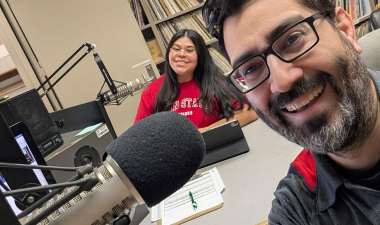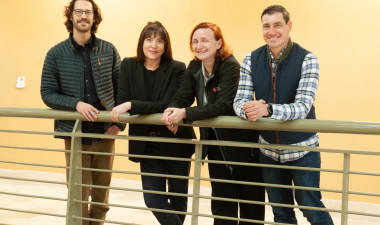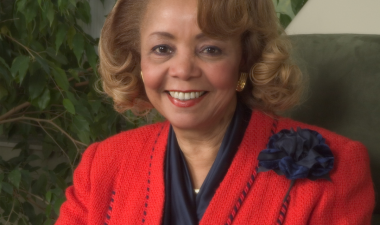Stanislaus State’s Sustainability team recently gathered to celebrate the collective efforts of departments across campus for their contributions to the Sustainability Tracking Assessment and Rating System (STARS) report.
The program featured lightning talks from faculty members as well as a student, with a welcome from Stan State’s Vice President for Business and Finance Rose McAuliffe, followed by an introduction to sustainability from Kat Marian, senior director of planning, design and sustainability.
McAuliffe praised the campuswide efforts which led to Stan State elevating its status as a leader in sustainability through academics by introducing sustainability emphases and themes in the curriculum. Facilitating interdisciplinary pathways for applied research and active learning has helped the University meet the goals outlined in the STARS report. The recent STARS Gold rating shows a vast improvement in academic credit areas.
“Sustainability is interwoven throughout nearly all aspects of the University’s programs and built environment,” McAuliffe said. “Each of us plays a part.”
Marian spoke about how sustainability is more than recycling and gave the crowd a better understanding of why it is important to the campus and community.
“Sustainability is commonly defined as ‘meeting the needs of the present without compromising the ability of future generations to meet their own needs,’” Marian said. “At Stan State, we define sustainability as a shared opportunity for improving the quality of life for all, now and for future generations.”
Doughnuts were served specifically because of the shape of the sweet treat. A slide was presented to the audience showing how the shape of a donut represents a compass aiming for the center of meeting the needs of social and planetary boundaries. This is a representation of sustainability that is rooted in ecological economics, known as “Doughnut Economics.”
This milestone marks the second time the STARS report has been completed at Stanislaus State. One goal of the STARS reporting system is to measure progress and encourage sustainability in all aspects of higher education. The upward trend in Stan State’s rating from silver to gold reflects dedication across campus toward sustainability goals.
Aligned with the California State University’s sustainability policy, the STARS report will be updated every three years. It is one way to measure the progress toward a more sustainable future. In 2022, STARS became mandatory for all CSUs, resulting in more collaboration between the universities to improve. It elects to conduct programming and collect data for reporting across all departments on campus. There are 68 different credits to be reported in total, with more than 60 data contributors. Some areas include academics or campus engagement whereas others include operations such as the waste and recycling program.
“We are here to celebrate our sustainability successes and learn about some of the sustainability-related work our faculty and students are involved in,” said Stan State Sustainability Specialist Jennifer Daniels providing an overview of the report results before introducing other speakers. “Our sustainability programs are intended to align with the United Nations Sustainable Development Goals.”
August Frisk, Stan State undergraduate geography student and research assistant, is part of a group of students measuring individual trees in the campus parking lots. Frisk said they measure about 15 trees an hour, so it is a slow process.
“We are researching how land is used on campus,” Frisk said. “It is estimated that 174 tons of CO2 is stored in the campus trees.”
Frisk said the trees not only remove carbon in the atmosphere but also filter rainwater and particulate matter as well as provide shade and a reduction of temperature.
The team of research students he works with gathers remote sensing with GIS software, conducts an analysis and then assesses the benefits including providing a habitat.
“I have documented over 720 species on campus, as of February 2025,” Frisk said.
According to him, just being outside improves a person’s mental and physical well-being.
The lightning talks continued with Andrew Conteh, Stan State political science faculty member. He stated that it is the role of all universities to promote sustainable development.
“I firmly believe the University plays a role in educating leaders and conducting research,” Conteh said. “We train future professionals in various fields outlined in sustainable reports and we need to shape the minds of future leaders.”
Stan State Professor of Psychology Kelly Cotter spoke to the group on Zoom from the Stanislaus State Stockton Campus, beginning with her personal sustainability journey, citing the first time she recalls getting excited about recycling back in 7th grade.
Cotter spoke about how she has created a new course at the Stockton Campus: Psychology of Climate Change and Sustainability. In the course, she focuses on sustainability from a psychological perspective. Students engage in individual projects, targeting a personal habit that can be changed. Whether it’s water energy, less time on social media or reducing meat consumption, each tracks their own progress.
In the future, she plans to create a community project that requires students to make a change in the community.
Associate Professor of Botany Andrew Gardner spoke to the group about the Wayne and Donna Pierce Trans-California Pathway emphasizing his focus on native plants and urban biodiversity as a collective effort. He is working with students, including Frisk, on a project to examine the benefits of trees.
Gardner would like to reach out to more members of the community and have more events in the Pathway like harvesting willows for basket weaving.
Daniels closed the hour-long event with a call to action. “I’d like to invite all of you to practice sustainability in whatever form you are inspired to.” Stan State Sustainability has ongoing outreach events. This fall, data collection will begin again for the next STARS report.



